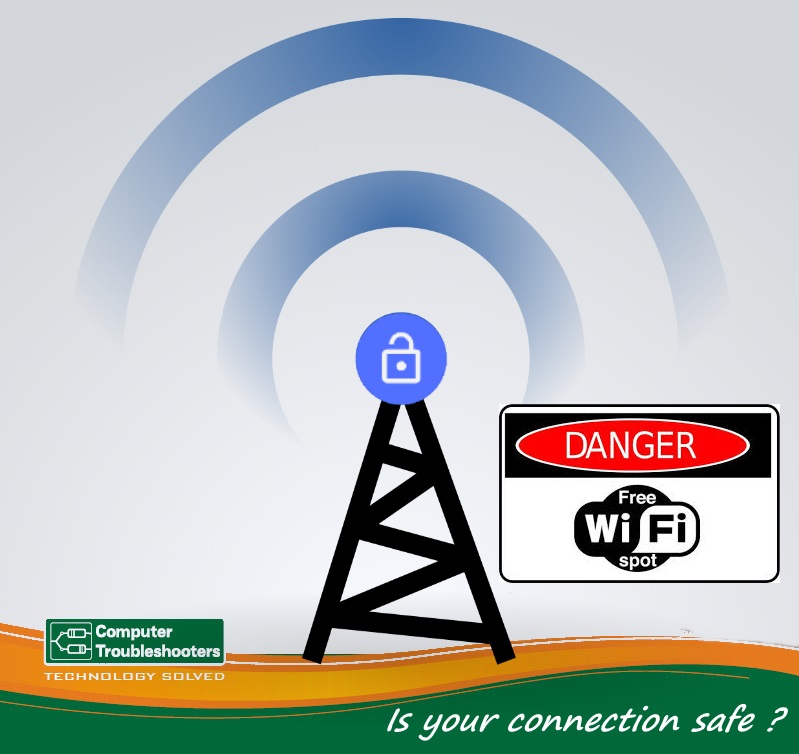Public Wi-Fi – 6 Stay Safe Tips.
You’re at the airport, a coffee shop or in a hotel, and you need to meet a deadline. To achieve this deadline, you need to access Public Wi-Fi. It is convenient, but it comes with risk. This article provides some tips to reduce your risk.
Tip Number 1: Use Commonsense.
It seems logical, but a good starting point is to think about the type of data you are sending and receiving when connected to public Wi-Fi. Aim to avoid sending or receiving valuable or sensitive information when connected.
Checking your social media, reading articles are generally safe activities, but think twice about accessing bank accounts, using credit cards and downloading sensitive documents. Limit what you do.
Choose wisely when connecting to a public Wi-Fi. Connect only in places where the organisation is known and established. For example, connect at the hotel in preference to the small café across the road.
Tip Number 2: Connect Securely.
Avoid hotspots when you are unsure if they are legitimate or not. Remember, one tactic commonly used by hackers is to create fake Wi-Fi hotspots. If you join such a fake hotspot then the hacker can gain access to your personal information and they can possibly access your files through file sharing.
Ensure once connected, that you turn off File sharing as this will limit access to your files. Remember tip #1 Commonsense. Why would you share your files in a public space?
If you’re visiting sites, then make certain that they have encryption and are using the HTTPS// protocol. To do this check the hyperlink in the browser and be certain you can see the HTTPS.
Tip Number 3: Use a VPN (Virtual Private Network).
If you’re in business, then you should always be using a VPN solution. A VPN creates an encrypted tunnel that allows data to pass securely over Public Wi-Fi networks. This will protect you from outsiders attempting to spy on your online activity. This VPN makes it a lot more difficult for a hacker to track your movements and steal your information.
Tip Number 4: Disable Auto Connect.
To avoid automatically connecting to a Wi-Fi network and perhaps an unsecure one at that, disable the auto connect feature on your device. In addition, always when you have finished using the Public Wi-Fi network it is suggested that in settings you proactively select the option to “Forget this network”
Tip Number 5: Keep the Firewall Enabled.
Turning on a Firewall can prevent hackers gaining unauthorised external access to your system. A firewall does not provide complete protection, but it is a setting that should always be turned on.
A Firewall actively monitors the data packets that come from network and checks whether they’re safe or not. If the firewall detects any malicious data packet the Firewall will block the delivery of that data packet thereby safeguarding your data from attacks
Tip Number 6: Take extra precautions to secure your devices.
No matter what device you are using (laptop, tablet or phone) ensure the device has a reputable anti-virus installed. Ask your local Computer Troubleshooter solutions expert about the latest options available.
Ensure your software has been patched with the latest updates and version of the software. Today we are living in a world that is facing multiple new threats daily. Consequently, software providers are always releasing patch updates to protect you and to avoid costly security incidents.
Consider the usage of two-factor or multi factor authentication. This makes it very difficult for any hacker as they need access to your second level authentication device such as your phone or your SMS inbox. This is gaining strong acceptance as more services are delivered through the cloud.
Conclusion:
The above tips are the basis for ensuring that you reduce the risks of using a public Wi-Fi and just may result in you not falling a victim of data theft. Most of these tips are simple, easy, relatively inexpensive and reduce the chances of cyber criminals gaining access to your valuable data.
The underlying aim is to make life very difficult for the Hackers, Crackers and Virus Attackers that lurk about looking for victims.
To understand more, please contact your local Computer Troubleshooter on 1300 28 28 78.
Further Reading:
The ACMA – Public Wi-Fi Handy Tips
The Australian Business Review – Public Wi-Fi a Security Risk

